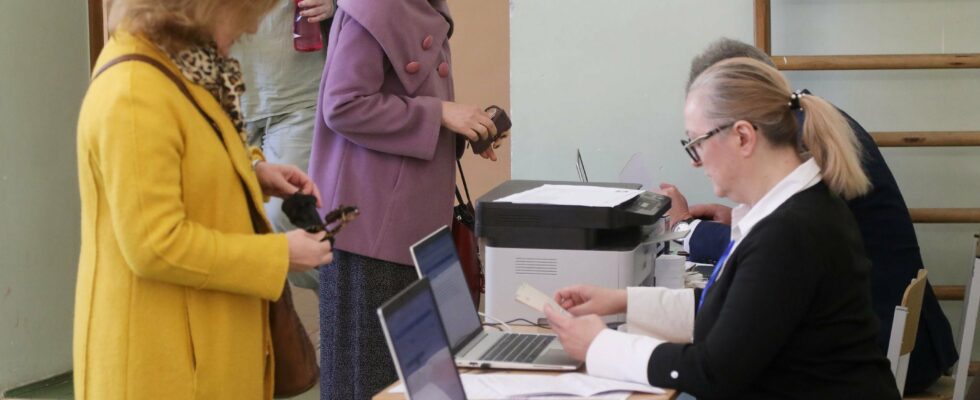Will Lithuania be the next target if Moscow wins its war against Ukraine? This is the fear of some Lithuanians. The inhabitants of this state are voting this Sunday, May 12 for the first round of the presidential election at the end of a campaign dominated by defense issues, while the Baltic country of 2.8 million inhabitants borders Highly militarized Russian exclave of Kaliningrad.
Polls give outgoing President Gitanas Nauseda, a 59-year-old pro-Ukraine former banker elected in 2019, a comfortable lead over the seven other candidates, including Prime Minister Ingrida Simonyte, who heads the center-right coalition government. since 2020, and a well-known lawyer, Ignas Vegele. Observers predict Gitanas Nauseda’s victory in the second round at the end of the month.
This Sunday, he should obtain more than 35% of the votes, according to a latest poll which gives 12% to Ignas Vegele and 10% to Ingrida Simonyte. The results are expected in the evening. The Lithuanian president co-leads, with the government, foreign policy and participates in EU and NATO summits. He must consult the government and Parliament for the appointment of the highest civil servants.
Lawyer Ignas Vegele, 48, made his name by opposing compulsory vaccination during the Covid-19 pandemic. He presents himself as an alternative to established political leaders and promises “more transparent” governance. Ingrida Simonyte, 49, defends conservative views on economic matters and liberal views on social issues. She particularly supports partnerships between people of the same sex, which are still controversial in this predominantly Catholic country. She is running for president for the second time, after being defeated by Gitanas Nauseda in the 2019 runoff election.
One of Ukraine’s largest donors
Lithuania, a former Soviet republic loyal to Ukraine, wants to strengthen its security against neighboring Russia. On April 26, Gitanas Nauseda echoed the idea put forward by his Polish counterpart Andrzej Duda of seeing NATO nuclear missiles deployed in his country to deter Russia. “The idea of deploying nuclear weapons is not hawkish or threatening for Russia, it is an element of deterrence,” the Lithuanian president declared to the press. “Lithuania’s understanding of the Russian threat is unanimous and indisputable, and the main candidates agree on it,” summarizes Linas Kojala, director of the Center for Eastern European Studies in Vilnius, to AFP.
Lithuania was the first European state to completely do without Russian oil, gas and electricity. The announcement came in April 2022, just three months after the invasion of Ukraine. Lithuania, a member of the European Union and NATO which hosted a crucial summit on Ukraine in July 2023 bringing together the 31 heads of state of the Atlantic Alliance, is one of the main donors of the ‘Ukraine. This country devotes significant spending to defense: it represents 2.75% of its GDP, which the government of Prime Minister Ingrida Simonyte wants to increase to 3%. Vilnius intends to use these funds to purchase additional tanks and air defense systems, but also to host a German brigade on its territory. Berlin plans to station around 5,000 soldiers in Lithuania by 2027. None of the main candidates have said they want to call these plans into question.
The relationship with Beijing also in the background
If the three main candidates agree on defense, they differ on relations between Lithuania and China. Bilateral ties with Beijing became strained in 2021, when Vilnius allowed Taiwan to open a representation under the self-governing island’s name, a departure from the common diplomatic practice of using the capital’s name, Taipei, to avoid angering Beijing.
China, which considers Taiwan as part of its territory and opposes any support for the island likely to give it any international legitimacy, has in retaliation downgraded its diplomatic relations with Vilnius and blocked its exports.
Gitanas Nauseda, who could try to renew dialogue with Beijing if he is re-elected, said during the election campaign that he saw “the need to change the name of the representative office.” Ingrida Simonyte opposed it, while Ignas Vegele supported Gitanas Nauseda, judging that “the opening of a representative office with this name was a rash decision”. “China’s reaction to the opening of the office was harsher than expected, which triggered the debate,” analyzes Linas Kojala, pointing to the negative consequences for local businesses of the deterioration of relations with Beijing.
